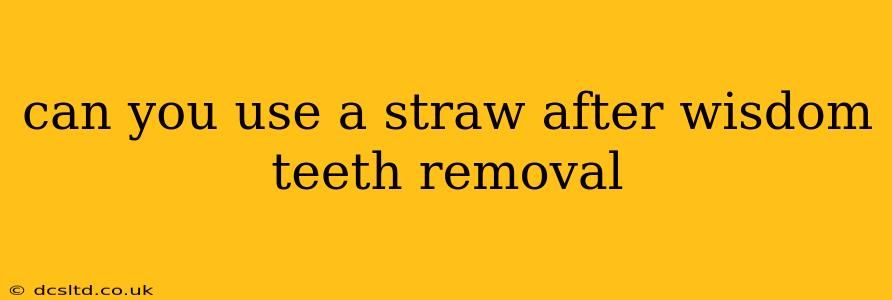Can You Use a Straw After Wisdom Teeth Removal? The Definitive Guide
Wisdom teeth removal is a common procedure, but the recovery process requires careful attention to detail. One question many patients have is about using straws after surgery. The short answer is: generally, no, you shouldn't use a straw after wisdom teeth removal. Let's delve deeper into why.
Why Should I Avoid Straws After Wisdom Teeth Extraction?
The primary reason you should avoid straws post-wisdom tooth extraction is the increased risk of developing a dry socket. A dry socket occurs when the blood clot protecting the extraction site dislodges, exposing the underlying bone and nerves. This causes significant pain, discomfort, and can prolong healing. Suction created by using a straw can dislodge this crucial blood clot.
What Happens if I Use a Straw After Wisdom Tooth Removal?
Using a straw creates significant suction in your mouth. This suction can pull on the blood clot that's forming in the extraction site, potentially dislodging it and leading to a dry socket. The intense pain associated with a dry socket is significantly more severe than the typical post-operative discomfort. It can also lead to increased healing time and potentially infection.
How Long Should I Avoid Straws After Wisdom Teeth Removal?
Your oral surgeon or dentist will provide specific post-operative instructions. However, as a general rule, you should avoid straws for at least 24-72 hours, and ideally, until the extraction sites have begun to heal significantly (usually a few days to a week). This allows the blood clot to form and stabilize properly. Always follow your doctor's recommendations; they will best assess your individual situation.
What Can I Drink After Wisdom Teeth Removal Instead of Using a Straw?
Drinking fluids is essential for a speedy recovery. However, you need to be careful about the method. Here's what you can do:
- Sip from a cup or glass: This minimizes suction and prevents the disturbance of the blood clot.
- Choose the right fluids: Stick to cool liquids like water, broth, or electrolyte drinks. Avoid hot beverages, as these can irritate the extraction sites.
- Avoid carbonated drinks: These can cause increased bubbling and pressure at the surgical sites.
- Use a spoon: Slowly sip from a spoon to ensure smooth and controlled intake.
Are There Any Exceptions to the No-Straw Rule After Wisdom Tooth Extraction?
While generally discouraged, there might be rare exceptions. If you're experiencing severe dehydration and have trouble drinking without a straw, consult your dentist or oral surgeon immediately. They can assess your situation and provide tailored guidance. However, it's always best to prioritize avoiding straws whenever possible to minimize the risks.
What Are Other Things to Avoid After Wisdom Teeth Removal?
Beyond straws, here are other things to avoid to promote proper healing:
- Smoking: This significantly increases the risk of dry socket and infection.
- Using a mouthwash: Rinsing your mouth too vigorously can dislodge the blood clot. Your dentist may suggest a gentle saline rinse, but follow their specific instructions.
- Touching the extraction sites: Avoid touching or probing the areas with your tongue or fingers.
- Strenuous activity: Rest and avoid strenuous physical activity to aid in proper healing.
Following your dentist’s post-operative instructions carefully is paramount for a smooth and comfortable recovery. If you experience any unusual pain, bleeding, or swelling, contact your dentist or oral surgeon immediately. Your comfort and health are the top priorities!
